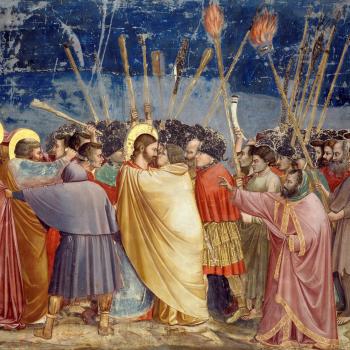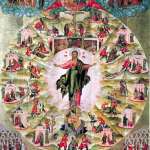A reader writes:
Today’s makers do not even “make” anything. They are Warren Buffets or Mitt Romney’s- folks who are glorified gamblers shuffling money into “best bets.”
Most of the folks we are talking about are not Steve Jobs who made things, or Bill Gates who programmed things. The bulk of the real “Makers” are in the financial sector, managing bizarre things like derivatives, etc.
Its not like someone is even investing in a “thing” or a company with the inspiration that one is supporting and assisting in the creation of a “things.” Most of the money is in instruments that invest in things or companies, like mutual funds.
These folks aren’t really John Galts, but are his accountants. That is who became today’s Makers.
I feel this is what warnings against usury were intended to guard against. Money just generating money without connection to God’s Children or His Creation.
You have perceived something that was noted very clearly by Dante. I talked about this once upon a time in at the Register:
One of the interesting and unexpected connections Dante makes in his Inferno is that he links the sin of sodomy with the sin of usury. Don’t see the connection? That’s understandable. You live in a civilization that no longer has a big problem with either. However, Dante’s thinking is this: He regards human activity as oriented toward fruitfulness that must spring from only two sources: Nature and Art. So, for Dante, a man is legitimately wealthy if he, say, grows a crop and sells it or makes a hat (or a poem) and sells them. Likewise, in the sexual realm, he is simply an ordinary orthdox Catholic who thinks that sex has the natural ends of union between husband and wife and the getting of children. That’s what it is for, just as eating is for the twin ends of nutrition and conviviality. So sexual acts, whether contraceptive or homosexual are “dead” acts that lead to no fruitfulness.
Okey doke, but what does that have to do with usury?
Well, for Dante, since fruitfulness can only proceed from Nature or Art (or, as we would say today, “raw natural resources and manufacture of goods and services”), it follows that mere chicanery by which dead gold or silver are made to “breed” by manipulation of interest rates by those who lend at interest is another form of perversion. So he links the sins of sodomy and usury. Both ignore Nature and both are forms of fruitfulness perverted to sterility and the attempt to “breed” something unnaturally.
Our civilization is currently undergoing the consequences of its addiction to usury and we still do not know where the bottom is. God willing, his mercy will triumph over our folly. Whether we will likewise figure out that our addictions to unnatural sex whether contraceptive or homosexual shall likewise end in sorrow is still to be seen.
At least 19th Century robber barons made something. 21st century robber barons make nothing except gambles with other people’s money. No wonder so many of them feel like they deserve high office so that they can do it by force and not merely by trickery and fraud.
And before you quickly and breezily declare that Modern Economics has Changed All that and Usury is Not a Sin Anymore, I suggest you bone up.
If there is any one lesson we should learn from the past decade, it’s not “This time, you can trust the immensely rich and powerful to do the right thing.” In the words of the Prophet Chesterton:
Only the Christian Church can offer any rational objection to a complete confidence in the rich. For she has maintained from the beginning that the danger was not in man’s environment, but in man. Further, she has maintained that if we come to talk of a dangerous environment, the most dangerous environment of all is the commodious environment. I know that the most modern manufacture has been really occupied in trying to produce an abnormally large needle. I know that the most recent biologists have been chiefly anxious to discover a very small camel. But if we diminish the camel to his smallest, or open the eye of the needle to its largest–if, in short, we assume the words of Christ to have meant the very least that they could mean, His words must at the very least mean this–that rich men are not very likely to be morally trustworthy. Christianity even when watered down is hot enough to boil all modern society to rags. The mere minimum of the Church would be a deadly ultimatum to the world. For the whole modern world is absolutely based on the assumption, not that the rich are necessary (which is tenable), but that the rich are trustworthy, which (for a Christian) is not tenable. You will hear everlastingly, in all discussions about newspapers, companies, aristocracies, or party politics, this argument that the rich man cannot be bribed. The fact is, of course, that the rich man is bribed; he has been bribed already. That is why he is a rich man. The whole case for Christianity is that a man who is dependent upon the luxuries of this life is a corrupt man, spiritually corrupt, politically corrupt, financially corrupt. There is one thing that Christ and all the Christian saints have said with a sort of savage monotony. They have said simply that to be rich is to be in peculiar danger of moral wreck. It is not demonstrably un-Christian to kill the rich as violators of definable justice. It is not demonstrably un-Christian to crown the rich as convenient rulers of society. It is not certainly un-Christian to rebel against the rich or to submit to the rich. But it is quite certainly un-Christian to trust the rich, to regard the rich as more morally safe than the poor.
There you go again, picking on Romney, Shea. (Note how we always have easy tears of pity for the immensely rich and powerful?) But nope. Romney’s just one part of the problem. Obama has never made a thing in his life either, and yet he too is fabulously wealthy, and from the same corporate sources. It’s not Left vs. Right. It’s our usurious Caesaroligarchic Class vs. the Rest of Us. It’s folly to trust them.















